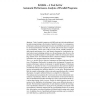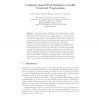417 search results - page 10 / 84 » From patterns to frameworks to parallel programs |
126
click to vote
JASIS
2000
15 years 2 months ago
2000
s In data mining, we emphasize the need for learning from huge, incomplete and imperfect data sets (Fayyad et al. 1996, Frawley et al. 1991, Piatetsky-Shapiro and Frawley, 1991). T...
142
Voted
IPPS
1999
IEEE
15 years 6 months ago
1999
IEEE
If parallelism can be successfully exploited in a program, significant reductions in execution time can be achieved. However, if sections of the code are dominated by parallel ove...
158
Voted
EUROPAR
2003
Springer
15 years 7 months ago
2003
Springer
Abstract. Today’s parallel computers with SMP nodes provide both multithreading and message passing as their modes of parallel execution. As a consequence, performance analysis a...
140
Voted
IPPS
2005
IEEE
15 years 8 months ago
2005
IEEE
Computational biology research is now faced with the burgeoning number of genome data. The rigorous postprocessing of this data requires an increased role for high performance com...
212
click to vote
CP
2009
Springer
16 years 3 months ago
2009
Springer
The most popular architecture for parallel search is work stealing: threads that have run out of work (nodes to be searched) steal from threads that still have work. Work stealing ...


